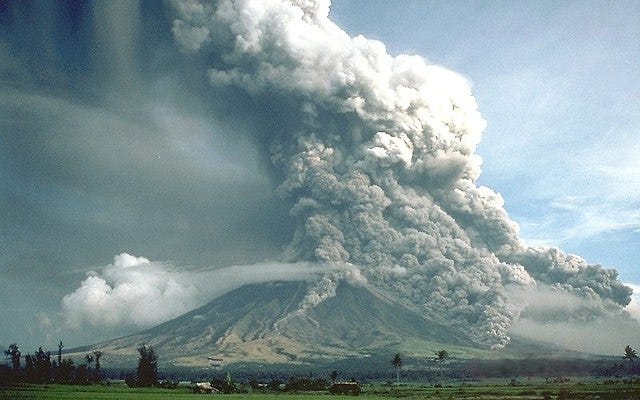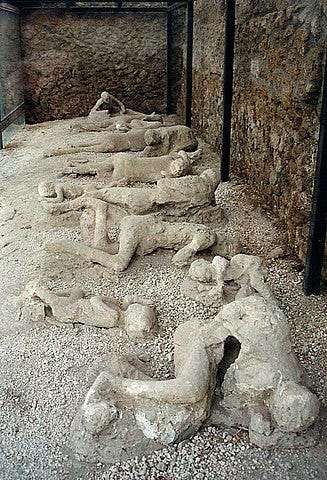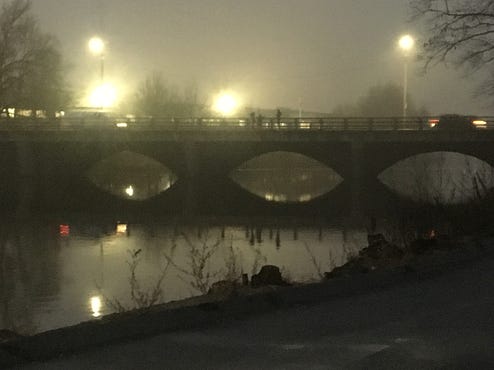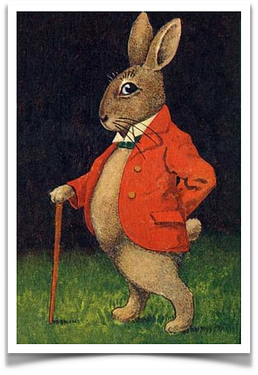Feake Hills, Crooked Waters - Did you see me putting pain in a stone?
The StartSomething different this time; the title is a quote from the Cate Le Bon song Pompeii. It’s from the album of the same name. Le Bon’s music is spare, simple, and yet far more evocative than it at first appears. It can be pretty difficult, for me, at least, to figure out what some of her work is really about. Maybe what distinguishes artistic expression from prose is that you feel it more than think it through, at least at first. And then the feeling leads you to pathways of thought you never would have noticed. Most of us get by pushing poets aside, but poetry is an art that may partake more immediately of more feeling than does prose. This being spring, by the way, it’s a good time to read (or reread) Spring Rain by Robert Haas. It’s in his collection Human Wishes, where he ventured into the gray mist between, suppose, more lyric, “poetic” poetry and prose. Cate Le Bon’s lyrics are not prosaic at all. In Moderation the chorus is: Picture the party where you're standing on a modern age I was in trouble with a habit of years And I try to relate. I don’t really understand what that means. But I understand how it feels. This issue is an attempt to go down some pathways of thought I never would have noticed otherwise. PompeiiPompeii was a city near Naples, Italy. Not too far — indeed, not nearly far enough — from Mount Vesuvius, a volcano that erupted in the year 79 and buried the whole city under ten or more feet of ash and pumice. It over about two days, and most of the people who lived there escaped. About 20,000 people lived there. But more than 1,000 died in the eruption. They hadn’t evacuated quickly enough, and when the pumice rain — unpleasant but survivable — was followed by pyroclastic flows the next day, it was too late. A pyroclastic flow is a very fast-moving, extremely hot cloud of ash, and it’s not at all survivable, even if you’re inside a building. The city, and the last of its inhabitants, was frozen in time under the ash and stone. Some of the survivors tried to return to salvage something of their lives, and there might have been some thieves and looters trying to grab anything of value too. The tops of some buildings could still be seen rising above the ash, and later some evidence was found of attempts to dig out here and there. But really the disaster was too big and too complete, and over the decades and centuries the city of Pompeii was forgotten. There were more volcanic eruptions, too, in 471 and in 512, that buried the place even deeper. And Pompeii faded from human memory and imagination. Until the late 1500s, when a project to dig an underground aqueduct to a mill in a nearby town (Torre Annunziata) accidentally discovered ancient walls decorated with pictures and texts. Nobody knew the name “Pompeii” in those days, and nobody really thought much about the discovery. A century later another excavation unearthed a wall inscribed with “Town councillor of Pompeii”, but it was misunderstood — they thought it referred to a villa belonging to a prominent Roman general named Pompey. Nearly another century passed before another inscription positively identified the place as Pompeii. Around the late 1700s, serious excavations began. Among other things, they discovered that many victims had been buried so quickly that their bodies were left in strange and sometimes gruesome poses. The bodies had decayed away, but left holes in the hardened ash. They injected plaster into the voids to recreate the forms of the victims, which were then put on display. Later — and even recently — clear resin is used instead of plaster, the better to preserve anything remaining, like bone fragments. That’s the strangest thing, to me, about Pompeii and places like it. People died there, in terrible agony. Even those who escaped left behind their homes and belongings. Pompeii is a place of sadness and loss. But it’s also a tourist attraction, and has been for centuries by now. We don’t go around digging up cemeteries to see what valuables people might have been buried with. Except that after enough time has passed, we do. There must be some impossible-to-define point at which the lost change from our personal ancestors into “other people,” and not even quite people at all. What is that point? Nobody thought twice about extracting King Tut and his treasure from what was clearly his tomb. I think the idea must have made some at least a little uncomfortable, but the only real expression of it turned into scary, superstitious stories and movies that represent preserved capsules of cognitive dissonance. There’s something not right here, we feel, but we can’t seem to express any rational objection. But there’s pain in that stone we dig up. WheelsPlaces like Pompeii — sites of pain and loss, or of lost aspirations, or even of something we can’t know — are not rare. People leave things behind. Sometimes they’re the valuables they’re buried with in the hope that value, in another existence, will remain. Sometimes they’re all the minutiae of life, preserved by an event nobody foresaw. Sometimes we really have no idea at all what they are, but we sense they were made or gathered or crafted with immense effort and skill, and so must have been important, so we wonder. But any of those things can be true of someone who lived a month ago, or a year, or ten years. We don’t generally excavate those, consider them ours now, and do more or less what we like with them. But there is that point when the people become others and the attitude we bring to the things they left behind (including their very bodies) becomes distanced and abstract, and we no longer care that we might be disturbing a grave. I picture this, for some reason, as a vast wheel. There’s a set of books by Robert Jordan (and now an Amazon TV series) called The Wheel of Time. I was never able to get interested in the books, but I’ve always found that title to be both meaningful and powerful. If time is really a wheel (or, as in a quote from the HBO series True Detective, “a flat circle”), then that point when people — ancestors — become others not really like us might just be at the opposite side of the wheel from where we are. The wheel is turning, and it will come around again, and maybe that’s when we rediscover the lost city of Pompeii, or realize there are treasures to be found in those vast, mysterious, immensely ancient pyramids. If you could stand aside from the wheel of time and somehow watch, maybe you could see when that change happens. When the people of another time and another place cross the veil of self and — possibly to their own surprise — find themselves in the mist of other. What is it like to cross that veil? Is it perceptible? Maybe somewhere it’s an enigmatic cause for celebration; a glass is raised in a season of ash. We’ve been through a couple years of pandemic-inspired isolation, and otherness certainly seems to be on the rise. That veil may be around more corners than anyone expects. I wonder how we can learn to recognize it? Harbor (Running Away)“I’m visiting the farm today,” said Raccoon, “do you want to come?” “Oh I dunno,” said Hare, “what’s going on at the farm?” “Apples,” said Raccoon. “The first apples are ripe.” “Now, how do you know that without going there first?” asked Hare. “Bear told me,” said Raccoon. “Bear is visiting the forest? And he didn’t stop and say hello?” Hare was indignant. “No, he told me without visiting,” said Raccoon. Hare stared at Raccoon. “How did he do that?” “He told one of the Wrens. Christopher, I think. The one that builds those really fancy nests. And Christopher told me.” “Oh,” said Hare, “I guess that makes sense. But how does Bear know the apples are getting ripe?” “I think he can smell them,” said Raccoon. “Oh come on,” said Hare, “Bear lives all the way up in the mountains, and that’s the opposite direction from the farm. How could he smell those apples from way up there?” “I don’t know how,” said Raccoon, “I just said I think that’s how he does it.” “Okay,” said Hare, “I’ll come to the farm with you, but I want to stop at Dog’s house on the way.” “Dog and Ferret’s house, you mean,” said Raccoon, who was good friends with Ferret. “Yes, Dog and Ferret’s house,” said Hare. “I want to ask Dog something.” “Good,” said Raccoon, “maybe Ferret likes apples.” When Hare and Raccoon got to Dog and Ferret’s house, Hare asked Dog if she could smell the apples getting ripe. “I don’t know,” said Dog. “I never tried. Let’s see.” Dog raised her nose into the air and sniffed a few times. “Yes,” she said, “there are some apples that are ripe already. But most of them aren’t ready yet. Why, are you visiting the farm?” “Yup,” said Hare, “but that’s not why I asked you. Bear told Christopher Wren there were ripe apples, and Christopher told Raccoon. Raccoon thinks Bear could smell the ripe apples from up in the mountains.” “Oh, sure,” said Dog, “that could happen. Bear has a really good nose, you know. And you can never be sure, with smells, how far they’re going to carry on the breeze. One time I smelled bananas, for no particular reason, and when I asked around, Janice and Bugsy Seagull told me there was a ship full of bananas about twenty miles offshore. In the ocean,” she added helpfully, noticing Hare looking confused. “Oh,” said Hare, “so it depends on the breeze?” “Seems to,” said Dog. “When you smell something, it’s not like hearing it or seeing it, you know. Smelling something means there are teeny, tiny bits of it that your nose can detect.” “YOUR nose, you mean,” said Hare. “I can smell things, but not as well as you.” “That’s all right,” said Dog, “you can hear better than anybody.” “Guess so,” said Hare. “Anyway, want to come with us to the farm?” “No thanks,” said Dog, “I have a new bone and I was planning on relaxing and chewing for a while. But maybe Ferret would like to go.” Raccoon had already found Ferret, who came out riding on her back. “Let’s go pick some apples!” called Ferret. “Why are you wearing those raggedy looking clothes?” asked Hare. He was beginning to get used to the costumes Ferret like to dress up in, but this getup wasn’t as fancy as usual. “I’m Johnny Appleseed, of course!” said Ferret. He stood up on Raccoon’s back and did a full turn. “Like it?” “I guess,” said Hare. “Who’s Johnny Appleseed?” “A person who planted apple seeds,” said Ferret. “There’s a book in Sally’s room…” “Okay,” said Hare suspiciously. He thought Ferret usually took things too far. “Let’s get going, Raccoon.” When they got to the farm, they stopped at the barn to say hello first. Maisy and Hortense were there, talking about cheese. “What’s wrong with Wensleydale?” Maisy was asking. “Oh, hello Hare, and Raccoon. And who is this?” Ferret hadn’t been to the farm before. “I’m Johnny Appleseed!” he said. “This is Ferret,” said Hare. “He moved in with Dog not too long ago. And he likes to dress up.” “It’s called costuming,” said Ferret. “It’s not strictly necessary, of course, but it’s a great help in getting into character.” “We came to pick some apples,” said Raccoon. “Some of them are ripe already.” “That’s what Jake and Oliver were saying,” said Hortense. “If you’re going to the orchard, you’ll see them. That’s where they went.” “Personally,” said Maisy, “I’ve never gotten a taste for apples.” “Nor have I,” agreed Hortense, “give me a nice field of grass every time, with no apple trees in the way.” “The shade can be nice, though,” said Maisy. “It’s the same shade as you get from a nice elm tree,” said Hortense, “and with an elm, there are no apples making a mess in the grass.” “You make an excellent point,” said Maisy, “although I wonder if the quality of shade from a beech tree might not be superior to both, because the leaves refract the light differently.” “Oh, I hadn’t considered that,” said Hortense, “and a large beech tree does have a lovely canopy.” “Quite true,” said Maisy, “the canopy is an important consideration. And that suggests that a stand of oaks might…” “See you later,” said Hare, and the three escaped the barn. “By the way,” said Ferret when were just outside the barn, “is it me, or do some of the folks around here seem a bit one-dimensional?” “What do you mean?” asked Hare. “It’s just that quite a few of them seem to be pretty much defined by just a couple of traits,” said Ferret. “If they were in a dramatic production, they would be secondary personas inserted just to further the plot; they’re not fully developed characters.” “Oh,” said Hare. “It’s no big deal,” said Ferret, “just something I’ve been wondering about. Like Beaver; what does he do that doesn’t have some connection to books? And isn’t it odd that the one who you can’t visit without getting wet is the one with a library? If he was in a comedic production, that would be a Humorous Detail.” “I guess,” said Raccoon. Hare could tell that Ferret was just getting warmed up, but luckily they arrived at the orchard, where they saw Jake and Oliver, the horses from the barn. “Ahoy there,” said Oliver, “the first apples are ripe! Is that why you came?” “It’s why I came,” said Raccoon. “I love apples.” “Apples are pretty good,” said Hare, “and there are always some extra carrots over in the carrot patch.” “I’m Johnny Appleseed!” said Ferret, doing his turn on Raccoon’s back again. “Pleezed t’meetcha,” said Jake. “This is really Ferret,” said Hare. “He lives with Dog.” When everyone was introduced, Jake and Oliver showed them the section of the orchard where ripe apples could be found. But someone was already there. “Oh, hello Donald, hi Doris,” said Oliver. “Forest guys, meet Donald and Doris Deer. They come visit sometimes. And they like apples.” “This is the rest of our family,” said Donald, as more deer came into the open. “Dennis, Daisy, Desmond, Denise, David, and Debbie.” One more deer, who was smaller and didn’t look quite like the rest of them, came out from behind an apple tree. “And this is Felix,” said Donald Deer. Ferret leaned over to whisper into Raccoon’s ear, “that would be another Humorous Detail. They’re turning out to be pretty common around these parts.” “Of course they are,” said Hare. Ferret, who had though his whisper was private, looked at Hare in surprise. Hare grinned and waved his long ears at Ferret. Ferret frowned. He thought about his childhood, growing up with a doting mother and a father who was usually cold and distant, too focused on work to pay much attention to Ferret and his siblings. He thought about how that trauma had played out later in his life, leading him to take stupid chances and narrow escapes from the authorities. How one of those adventures had led to him meeting Felicia, his first love, and how it hadn’t worked out because Felicia had come from a rich family whose parents couldn’t accept her relationship with anyone from the lower classes. Ferret shook his head, irritated. “Geez,” he said to himself, “maybe being one dimensional instead of a fully realized character does save on clichéd exposition.” ModerationI can’t really say how this issue evokes Cate Le Bon’s Pompeii, or even if it does. How do you represent music in prose? Maybe there’s a wheel, or a veil, or some sort of transition that helps. One way or another, you can quit the earth, but you can’t beat the Mother of Pearl. You can find Le Bon’s album here. Give it a listen and let me know if you see through the veil. If you liked this issue of Feake Hills, Crooked Waters, please share it! |
Older messages
The Software Issue
Monday, May 30, 2022
How to become wise?
Bodies in Motion
Monday, May 30, 2022
Somewhere west of Laramie
Repetition
Monday, May 30, 2022
Gimme that beat, boys
The issue with numbers
Monday, May 30, 2022
You can count on it — but should you?
It’s All the Rage
Monday, May 30, 2022
But what do you do with it?
You Might Also Like
Community Tickets: Advanced Scrum Master (PSM II) Class of March 26-27, 2025
Tuesday, March 4, 2025
Save 50 % on the Regular Price ͏ ͏ ͏ ͏ ͏ ͏ ͏ ͏ ͏ ͏ ͏ ͏ ͏ ͏ ͏ ͏ ͏ ͏ ͏ ͏ ͏ ͏ ͏ ͏ ͏ ͏ ͏ ͏ ͏ ͏ ͏ ͏ ͏ ͏ ͏ ͏ ͏ ͏ ͏ ͏ ͏ ͏ ͏ ͏ ͏ ͏ ͏ ͏ ͏ ͏ ͏ ͏ ͏ ͏ ͏ ͏ ͏ ͏ ͏ ͏ ͏ ͏ ͏ ͏ ͏ ͏ ͏ ͏ ͏ ͏ ͏ ͏ ͏ ͏ ͏ ͏ ͏ ͏ ͏ ͏ ͏ ͏ ͏ ͏ ͏
eBook & Paperback • Demystifying Hospice: The Secrets to Navigating End-of-Life Care by Barbara Petersen
Monday, March 3, 2025
Author Spots • Kindle • Paperback Welcome to ContentMo's Book of the Day "Barbara
How Homer Simpson's Comical Gluttony Saved Lives
Monday, March 3, 2025
But not Ozzie Smith's. He's still lost, right?
🧙♂️ Why I Ditched Facebook and Thinkific for Circle (Business Deep Dive)
Monday, March 3, 2025
Plus Chad's $50k WIN ͏ ͏ ͏ ͏ ͏ ͏ ͏ ͏ ͏ ͏ ͏ ͏ ͏ ͏ ͏ ͏ ͏ ͏ ͏ ͏ ͏ ͏ ͏ ͏ ͏ ͏ ͏ ͏ ͏ ͏ ͏ ͏ ͏ ͏ ͏ ͏ ͏ ͏ ͏ ͏ ͏ ͏ ͏ ͏ ͏ ͏ ͏ ͏ ͏ ͏ ͏ ͏ ͏ ͏ ͏ ͏ ͏ ͏ ͏ ͏ ͏ ͏ ͏ ͏ ͏ ͏ ͏ ͏ ͏ ͏ ͏ ͏ ͏ ͏ ͏ ͏ ͏ ͏ ͏ ͏ ͏ ͏ ͏ ͏ ͏ ͏ ͏ ͏
I'd like to buy Stripe shares
Monday, March 3, 2025
Hi all, I'm interested in buying Stripe shares. If you know anyone who's interested in selling I'd love an intro. I'm open to buying direct shares or via an SPV (0/0 structure, no
What GenAI is doing to the Content Quality Bell Curve
Monday, March 3, 2025
Generative AI makes it easy to create mediocre content at scale. That means, most of the web will become mediocre content, and you need to work harder to stand out. ͏ ͏ ͏ ͏ ͏ ͏ ͏ ͏ ͏ ͏ ͏ ͏ ͏ ͏ ͏ ͏ ͏ ͏
mRNA breakthrough for cancer treatment, AI of the week, Commitment
Monday, March 3, 2025
A revolutionary mRNA breakthrough could redefine medicine by making treatments more effective, durable, and precise; AI sees major leaps with emotional speech, video generation, and smarter models; and
• Affordable #KU Kindle Unlimited eBook Promos for Writers •
Monday, March 3, 2025
Affordable KU Book Promos "I'm amazed in this day and age there are still people around who treat you so kindly and go the extra mile when you need assistance. If you have any qualms about
The stuff that matters
Sunday, March 2, 2025
Plus, how to build a content library, get clients from social media, and go viral on Substack. ͏ ͏ ͏ ͏ ͏ ͏ ͏ ͏ ͏ ͏ ͏ ͏ ͏ ͏ ͏ ͏ ͏ ͏ ͏ ͏ ͏ ͏ ͏ ͏ ͏ ͏ ͏ ͏ ͏ ͏ ͏ ͏ ͏ ͏ ͏ ͏ ͏ ͏ ͏ ͏ ͏ ͏ ͏ ͏ ͏ ͏ ͏ ͏ ͏ ͏ ͏ ͏ ͏
Food for Agile Thought #482: No Place to Hide from AI, Cagan’s Vision For Product Teams, Distrust Breeds Distrust
Sunday, March 2, 2025
Also: Product Off-Roadmap; AI for PMs; Why Rewrites Fail; GPT 4.5 ͏ ͏ ͏ ͏ ͏ ͏ ͏ ͏ ͏ ͏ ͏ ͏ ͏ ͏ ͏ ͏ ͏ ͏ ͏ ͏ ͏ ͏ ͏ ͏ ͏ ͏ ͏ ͏ ͏ ͏ ͏ ͏ ͏ ͏ ͏ ͏ ͏ ͏ ͏ ͏ ͏ ͏ ͏ ͏ ͏ ͏ ͏ ͏ ͏ ͏ ͏ ͏ ͏ ͏ ͏ ͏ ͏ ͏ ͏ ͏ ͏ ͏ ͏ ͏ ͏ ͏ ͏ ͏




